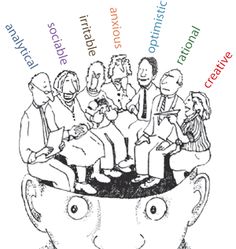IFS Internal Family Systems Therapy is a relatively new form of therapy that is gaining in popularity. It is helpful for a wide range of issues, and more and more people are considering it as an option. In this blog post, we will explore what IFS Internal Family Systems Therapy is, who can benefit from it, how it works, and why you might want to consider it. We will also look at how to find an IFS therapist and what to look out for when choosing one. Finally, we will explore the benefits of IFS therapy and some of its limitations.
Contents
Understanding IFS Therapy
Internal Family Systems Therapy (IFS) is a type of psychotherapy that helps people heal from trauma and become more self-aware. It was developed by Dr. Richard Schwartz in the 1980s and has since been used to help thousands of people worldwide.
Theory Behind IFS Therapy

IFS therapy is based on the belief that we all have an internal system made up of different parts, or sub-personalities, that each have their unique perspectives and needs. These parts are often in conflict with each other, which can lead to problems in our lives. IFS therapy focuses on helping people heal the wounds of their past and become more self-aware so they can live more fulfilling lives.
6 Fs In IFS Therapy
There are six key concepts in IFS therapy: family, feelings, faith, function, future, and foundation.
- Family: We all come from families that have had a profound impact on our lives. Our families can either support or hinder our growth and development.
- Feelings: Feelings are normal and natural. They are neither good nor bad, but they can be uncomfortable.
- Faith: Faith is the belief in something larger than ourselves that gives our lives meaning and purpose.
- Function: We all have a unique function in life. When we are living our function, we feel fulfilled and satisfied.
- Future: The future is unknown, but we can choose to live in hope or fear.
- Foundation: Our foundation is our sense of self. It is the core of who we are and what we believe in.
History And Development
IFS therapy was developed by Dr. Richard Schwartz in the 1980s and has since been used to help thousands of people worldwide. Dr. Schwartz developed IFS after working with patients who had multiple personality disorders (now known as dissociative identity disorder).
He noticed that these patients often had different parts of their personalities that conflicted with each other. He realized that if he could help these patients heal the wounds of their past and become more self-aware, they could live more fulfilling lives.
Unfolding IFS Therapy

IFS therapy is a relatively new form of therapy, so it is still unfolding. However, it has already been shown to be helpful for a wide range of issues.
Who Can It Help
IFS therapy is helpful for a wide range of issues. It can be helpful for people who are struggling with:
- anxiety,
- depression,
- trauma,
- addiction,
- eating disorders, and
- more.
It can also be helpful for people who are struggling in their relationships or who are having difficulty reaching their goals. If you are struggling with anything in your life, IFS therapy may be able to help.
How Does It Work
IFS therapy usually takes place in weekly sessions. In each session, you will work with your therapist to explore your internal family of parts. You will learn about the different perspectives of your parts and how they are affecting your life. You will also learn techniques for resolving conflicts between parts and bringing them into harmony with each other.
What To Expect
In IFS therapy, you can expect to:
- Explore your internal family of parts.
- Feel more self-aware and empowered.
- Learn how to resolve conflicts between parts.
- Bring your parts into harmony with each other.
- Learn about the different perspectives of your parts.
Techniques Used In IFS Therapy
IFS therapy uses a variety of techniques to help you heal your wounds and become more self-aware. These techniques include visualization, journaling, and focusing on the present moment.
- Visualization is a technique that allows you to see your internal system of parts. This can be helpful because it allows you to understand the different perspectives of your parts and how they are affecting your life.
- Journaling is another technique that can be used in IFS therapy. This involves writing down your thoughts and feelings about your parts and their conflict with each other.
- Focusing on the present moment is another technique that can be used in IFS therapy. This involves paying attention to your thoughts, feelings, and sensations in the present moment without judgment.
Your therapist will also help you to identify your core wound and work through it. The goal is to help you heal from your past so you can live a more fulfilling life.
Evaluating IFS Therapy

IFS therapy is helpful for a wide range of issues. It is generally considered to be a safe and effective form of therapy.
However, as with any type of therapy, there are some risks involved. These risks include the potential for reliving trauma and feeling worse before feeling better.
It is important to discuss these risks with your therapist before starting IFS therapy.
Benefits of IFS Therapy
IFS therapy has several benefits.
- It can help you to resolve the difficulties you are experiencing, improve your relationships, and reach your goals.
- It can also help you to understand yourself better and learn how to manage conflict healthily.
- Additionally, IFS therapy is usually shorter than other forms of therapy, so it can be less expensive in the long run.
Limitations of IFS Therapy
IFS therapy is not without its limitations.
- It is a relatively new form of therapy, so there is not as much research on it as there is on other forms of therapy.
- Additionally, IFS therapy requires you to be willing to explore your internal world, which may not be something you are comfortable with.
- Finally, IFS therapy may not be right for everyone. If you are not willing to work on yourself or if you are not ready to face your issues, IFS therapy may not be the right choice for you.
Why Consider It
There are many reasons to consider IFS therapy. If you are struggling with anything in your life, it may be able to help. It is also a relatively new form of therapy, so it may be helpful to try something new. Additionally, IFS therapy has been shown to have several benefits, which we will explore below.
Finding an IFS Internal Family Systems Therapist

If you are interested in IFS therapy, the first step is to find a therapist who is trained in this modality. There are a few ways to do this.
How To Find One
- The best way to find an IFS therapist is to ask around or search online.
- If you know anyone who has gone to therapy before, ask them if they have any recommendations.
- You can also search online for therapists in your area who practice IFS therapy.
What To Look Out For
When you are searching for an IFS therapist, there are a few things to keep in mind.
- First, make sure that the therapist is licensed and has experience treating the issues you are dealing with.
- Second, make sure that the therapist is trained in IFS therapy. You can ask them about their training or look for information on their website.
- Finally, make sure that you feel comfortable with the therapist and that they seem like someone you can trust.
Red Flags To Avoid
There are a few red flags to watch out for when you are searching for an IFS therapist.
- First, avoid therapists who promise quick results or guarantee that they can fix your problems.
- Second, avoid therapists who seem judgmental or dismissive of your feelings.
- Finally, avoid therapists who are not willing to answer your questions about IFS therapy or who seem secretive about their methods.
Pursuing Training In IFS Internal Family Systems Therapy

If you are interested in pursuing training in IFS therapy, there are a few things to keep in mind.
- First, make sure that you are interested in the modality and that you feel like it is a good fit for you.
- Second, make sure that you have the time and resources to commit to training.
- Finally, make sure that you find a reputable training program. You can ask your friends or family for recommendations or search online for reviews.
NOTE: We invite you to list yourself on Therapy Mantra’s IFS Therapist Directory.
Conclusion
IFS Internal Family Systems Therapy is a relatively new form of therapy that is gaining in popularity. It is helpful for a wide range of issues, and more and more people are considering it as an option.
A Word From Therapy Mantra
Your mental health — Your psychological, emotional, and social well-being — has an impact on every aspect of your life. Positive mental health essentially allows you to effectively deal with life’s everyday challenges.
At TherapyMantra, we have a team of therapists who provide affordable online therapy to assist you with issues such as depression, anxiety, stress, workplace Issues, addiction, relationship, OCD, LGBTQ, and PTSD. You can book a free therapy or download our free Android or iOS app.


